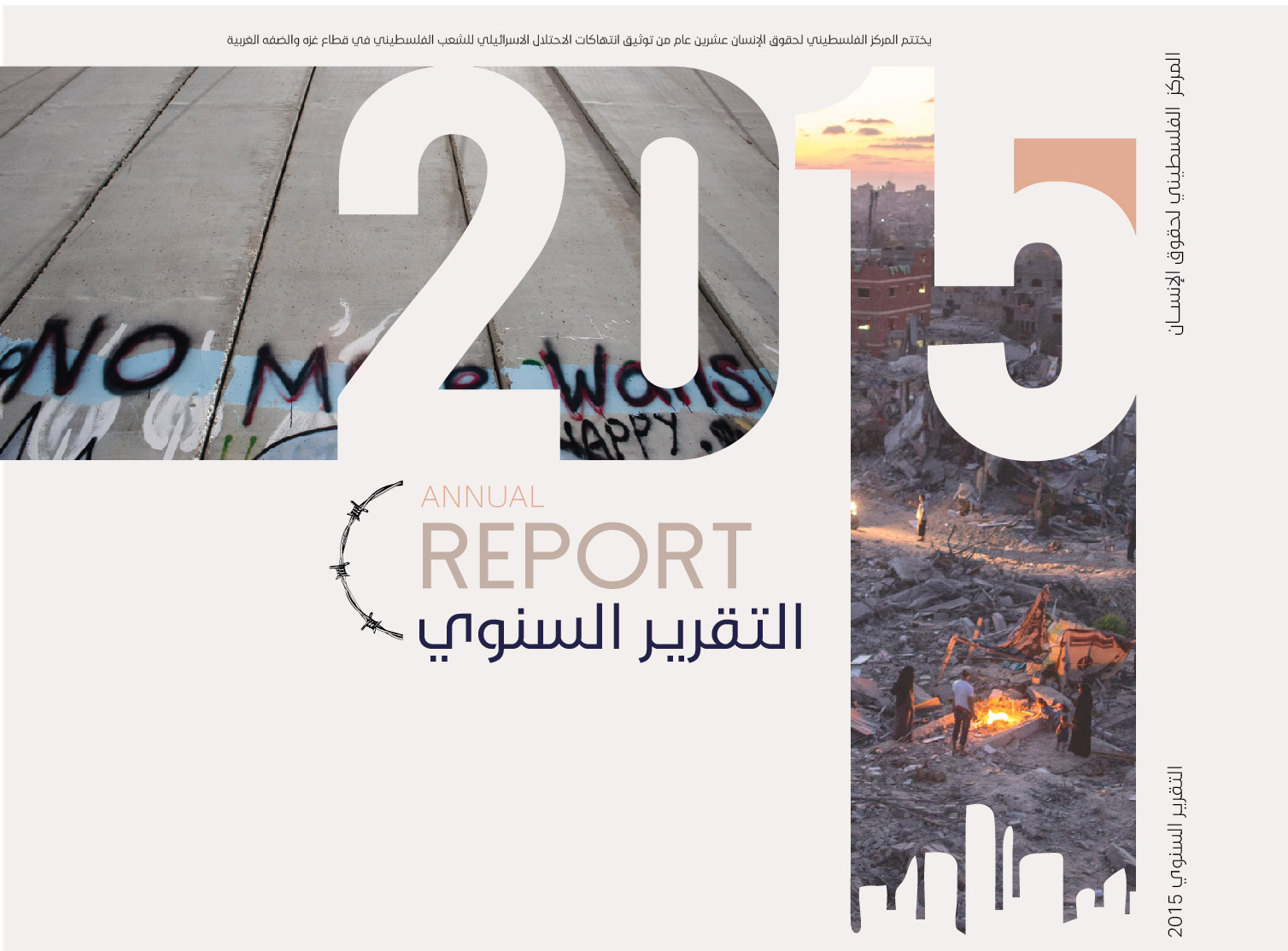
The Palestinian Center for Human Rights (PCHR) issued its 2015 annual report covering the period from 01 January to 31 December 2015. It should be noted that this is the 19th report of its kind, as PCHR has published annual reports since 1997.
The report includes an overview of the human rights situation in the occupied Palestinian territory (oPt), including war crimes and violations of the international humanitarian and human rights laws committed by Israeli forces against Palestinian civilians throughout the year. The report also addresses violations of human rights and obstacles to democratic reform relevant to the Palestinian Authority (PA). This section includes recommendations to both the international community and the PA.
The situation of human rights and international humanitarian law in the oPt has unprecedentedly deteriorated in 2015. While the Israeli illegal closure imposed on the Gaza Strip for the 9th consecutive year was the most prominent violation of human rights in the Gaza Strip, the summary executions, disproportionate force employed by Israeli forces and escalation of settler attacks were the most prominent violations of human rights in the West Bank, especially in the last quarter of the year. On the Palestinian level, the situation of human rights and public freedoms continued to deteriorate in view of the internal split in the PA and the efforts failing to achieve the national reconciliation.
The Gaza Strip witnessed an unprecedented deterioration of the humanitarian situation in view of the greatest man-made catastrophe done by the Israeli occupation due to the collective punishments continuously imposed on nearly 2 million civilians and resulting from the closure. This year did not witness any dramatic change relevant to the closure policy in contrary to the Israeli claims. Israeli forces have continued to impose restrictions on the freedom of movement of persons and goods in a way that aggravated the civilians’ suffering and hindered the economic development. Furthermore, tens of thousands of Palestinian civilians have been rendered homeless because their houses were destroyed during 3 Israeli offensives on the Gaza Strip in less than 6 years. By the end of 2015, the UN Reconstruction Mechanism has proven again to be ineffective and that it was set up to institutionalize the closure and make it acceptable on the international level. Almost a year after the UN Mechanism was put into force; it became clear that the reconstruction process would take decades in light of the ongoing restrictions imposed on the entry of construction materials.
In the West Bank, the Israeli forces have continued to commit willful killings and violations of the right to life against Palestinian civilians in the oPt. The last quarter of the year witnessed an unprecedented escalation in willful killing crimes and the employment of excessive and disproportionate force against civilians in light of the ongoing escalation witnessed in the oPt in coincidence with the shooting incidents and excessive force used in the latest wave of protests. PCHR documented dozens of cases in which Israeli forces, settlers and security and police officers summarily executed Palestinians accused of stabbing or attempting to stab Israelis. Furthermore, during the reporting period, the settler attacks increased against Palestinian civilians throughout the West Bank, including occupied East Jerusalem. Israeli forces further imposed restrictions on the movement of persons in the West Bank by erecting military checkpoints. This year also recorded an increase in arrests accompanied by torture and maltreatment.
Additionally, the report covers the Palestinian violations of human rights, as the human rights situation has been deteriorating in view of the continuing internal split and efforts failing to achieve reconciliation in contrast to the expectations based on al-Shati’ agreement in April 2014 and the consequent formation of the National Unity Government in June 2014. The internal split resulted in a collapse in the Palestinian political system, including the existence of 2 independent judicial systems in the Gaza Strip and West Bank, the paralysis of the Palestinian Legislative Council (PLC) and its failure to carry out its supervisory and legislative duties, and the executive authority’s acts in absence of accountability.
This affected the human rights situation in the PA-controlled areas, as the majority of internal violations are related to the split. These violations cover a setback in public freedoms, including the freedom of expression and the right to peaceful assembly, arbitrary political arrests and torture crimes. Moreover, the split remarkably aggravated the living conditions of the Palestinian people, particularly in the Gaza Strip, while the crisis of Rafah International Crossing Point unprecedentedly exacerbated because the crossing was only open for a few days throughout the whole year, which negatively affected dozens of patients, students and holders of residency permits abroad. In addition, the electricity crisis already deteriorating for 10 years exacerbated, as the outage hours increased. On the other hand, 2015 ended but no agreement was reached to solve the salary problem of thousands of civil servants of the previous Gaza government in light of the decision taken by the Change and Reform Bloc, which convenes on behalf of the PLC in Gaza, to allocate State lands for civil servants instead of giving them their dues.
—
To see the report in Arabic click here.